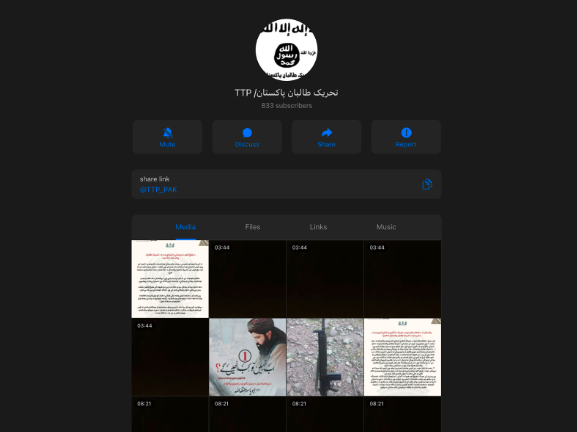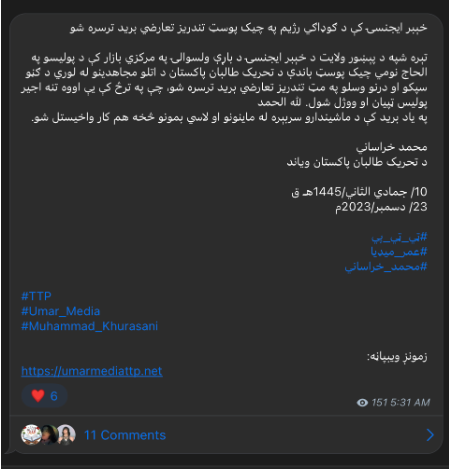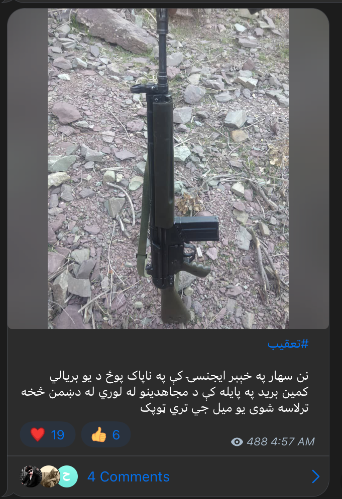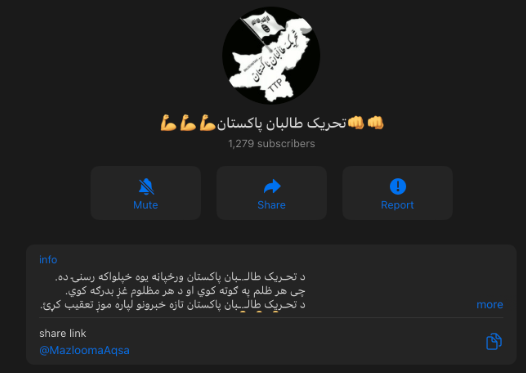Introduction
Tehreek-e-Taliban Pakistan (TTP) is an Islamist terrorist group that operates under the umbrella of the Afghan Taliban (AT) along the Afghanistan-Pakistan border. The media wing of the TTP, known as Umar Media, has published anti-state jihadist propaganda and other Islamic fundamentalist content online since the early 2000s. Contemporary media outputs from the TTP have largely used messaging applications like Telegram and WhatsApp to disseminate information and propaganda, highlighting the outcomes of recent attacks and motivating others to continue their efforts in the holy war (jihad) against the Pakistani state. These online groups appear to serve as mouthpieces of the TTP, circulating content in a manner sympathetic to or in support of the TTP and the greater Taliban organisation. Previous studies have analysed the diverse digital ecosystem of the TTP, but little research has been done on specific supporter groups on Telegram. This Insight analyses TTP-affiliated messaging groups on Telegram and the use of social media in sharing propaganda and mobilising support for the TTP’s cause.
TTP Sympathisers, News Circulation & Propaganda on Telegram
While it is difficult to ascertain the total authenticity of TTP-related groups on Telegram, several established online communities utilising the TTP name have amassed hundreds of subscribers on the app. One group called ‘TTP/تحریک طالبان پاکستان’ (Tehreek-e-Taliban Pakistan, written in Urdu) shares messages reportedly from TTP spokesperson Muhammad Khorasani (Fig. 1). A message from 23 December 2023 highlights the results of an attack “last night” on the “Gudagi regime check post” in the Bara district of Peshawar province. The message confirms the killing of seven policemen with “multiple light and heavy weapons” (Fig. 2). At the bottom of the post, hashtags like ‘#TTP, #Umar_Media and #Muhammad_Khorasani’ appear above a link to the Umar Media website. Various Urdu and Pashto comments left under the post read “Alhamdulillah”, or ‘Praise be to God,’ affirming support for the terror attack on Pakistani forces.

Fig. 1: A TTP affiliate group on Telegram called ‘TTP/تحریک طالبان پاکستان’ or ‘Tehreek-e-Taliban Pakistan,’ written in Urdu

Fig. 2: A message from 23 December 2023 highlighting the results of an overnight attack
Another message in this group from 21 December 2023 summarises the results of an attack in South Waziristan, claiming “the attack of the dirty army… was foiled.” The post goes on to read in Urdu: “Just a moment ago, the army attacked the Mujahideen of the Tehreek-e-Taliban Pakistan…The raid failed, two mercenaries were killed and many others were injured.” The message ends with “The dirty army, like in the past, chose an escape route due to cowardice and ended the raid”, followed by a link to the Umar Media website.
A post from 18 December 2023 shows a video of various graphic images and footage that the posting user claims were committed by Pakistani military personnel. The video is captioned with “If not now, when will you open? This video contains a video of atrocities committed by Pakistani security forces on people in Madi Kalachi area of DI Khan province and a short message from the governor of DI Khan province, Abu Yasir Sahib.” Another post from the same day shows a picture of an assault rifle, claiming it had been retrieved from security forces (Fig. 3)

Fig. 3: An assault rifle claimed to have been retrieved by the TTP from Pakistani security personnel
Another Telegram group, named ‘Taliban magazine’ in Urdu, shares monthly downloadable issues of the Umar Media magazine, covering various TTP activities of the month. The group’s bio reads “The official magazine of Tehreek-e-Taliban Pakistan ‘Taliban’”. Along with Word and PDF files of the magazine, messages include bullet points highlighting relevant talking points. The accompanying post for the December 2023 issue includes references to the mass expatriation of Afghan refugees from Pakistan as well as declaring local land as occupied. The message also includes the name of Abdullah Mujahid, a former Taliban operative currently held in extrajudicial detention in an Afghan prison. This Telegram group also links to an Umar Media website and has 900+ subscribers.
A third Telegram group called ‘Tehreek-e-Taliban Pakistan’ in Urdu boasts over 1.9k subscribers. The bio of this group reads, in part, as “…which points out every injustice and makes the voice of every oppressed ugly. Follow us for the latest news of Tehreek-e-Taliban Pakistan.” This group appears less active as the aforementioned Telegram groups, having not posted a message since January 2023.
Finally, a group named ‘Mazlooma Aqsa’ with almost 1.3k subscribers, is adorned with a profile picture of a Taliban flag spread across a geographic outline of Pakistan (Fig. 4). The group’s most recent post details a raid carried out against the “impure” army in Dera Ismail Khan on 11 January 2024, affirming the death of a Pakistani security officer. This group also appears as a TTP mouthpiece, with messages coming directly from Muhammad Khorasani.

Fig. 4: A TTP affiliate group named ‘Mazlooma Aqsa’ with almost 1.3k subscribers, adorned with a profile picture of a Taliban flag spread across a geographic outline of Pakistan
By and large, participation in these groups allows for rapid news-sharing of recent TTP attacks, which might not otherwise be possible on other social media platforms and the mainstream media. Subscribers to these groups can receive the inside scoop on attacks against Pakistani security forces, where they can celebrate and applaud the death and destruction of the perceived enemy. Users who may have no prior extremist background can easily engage, first-hand, in a graphic dialogue exalting egregiously violent terrorist operatives.
Implications of the TTP & Affiliated Groups on Telegram
In recent years, Telegram has become a platform of choice for many fringe extremist and terrorist groups, from South Asia to the United States to Europe. Telegram’s light-touch moderation and regulation policies and encrypted spaces are valuable tools for TTP extremists and sympathisers to operate and communicate freely. As outlined above, the groups studied here disseminate virulent anti-state rhetoric, accusing the Pakistani government and its armed forces as corrupt, unjust and ‘dirty.’ These sentiments directly reflect the ultimate goal of the TTP in diluting the power of the Pakistani state and implementing Sharia, or fundamentalist, Islamic law in the country.
For many pro-TTP supporters, Telegram is a safe haven for sharing terrorist messages and sentiments. Through participation in groups such as those explored in this analysis, Telegram serves as a central source of updated information on the activities of the TTP, the results (and perceived successes) of violent attacks and direct statements from TTP spokesperson Muhammad Khorsani. Commenters can affirm their support for the cause without fear of their messages being deleted or their accounts being removed, as they likely would be on more regulated social media platforms. Anti-state rhetoric and the vilification of the Pakistani government and its counter-insurgency forces can be shared without the risks of making such statements publicly. Like-minded individuals can convene in pro-TTP Telegram groups to share ideas and express their vehement opposition to the state and their ultimate desire to establish an Islamic Emirate in Pakistan.
Since the Taliban regained power in Afghanistan with the withdrawal of US troops in 2021, the TTP has seen a resurgence of influence in the Pakistan-Afghanistan region. Last year, attacks carried out by the TTP resulted in the deaths of almost 1,000 Pakistanis, a large majority of whom were counter-insurgency security personnel. Afghanistan has long been a safe haven for TTP fighters; Islamabad affirms the group moved its central command to Afghanistan with the return of the Taliban.
The ramifications of extremist gatherings on Telegram are considerable. Group members are actively sharing messages, photos and videos of weapons and violent attacks while promoting jihadist ideology. This fosters an environment which reinforces extremist ideas, enabling users to build upon and solidify their fringe beliefs through interaction with like-minded individuals. While there has been no direct calls to arms shared within these groups, praise for attacks against Pakistani security forces is commonplace. Messages of support rallying the backing of the TTP can potentially mobilise users to engage in real-world violence.
The Future of the TTP in Unregulated Online Spaces
The TTP and its affiliates and sympathisers will likely continue to employ Telegram as a tool for convocation. Consequently, users that either inadvertently or purposefully come across pro-TTP online groups have the potential to become radicalised. Online applications like Telegram facilitate extremist radicalisation due to less stringent moderation policies than mainstream platforms. Within these online groups, messages shared on behalf of official TTP spokesperson Muhammad Khorasani carry great credibility and influence compared with more generic jihadist messages. As a result, they are more capable of swaying potential recruits and sympathisers.
As long as Telegram and other end-to-end encrypted social platforms are free to access, extremists will continue to utilise these applications to advance their agendas. The platform breaks down geographical barriers, allowing for the mass mobilisation of potentially violent dissidents globally. Tech companies must strengthen their regulatory guidelines to protect against the organisation, informal or otherwise, of extremist ideological groups. Users worldwide can access these groups using simple buzzwords related to the TTP. To address this challenge, tech companies must revise and update their policies to mitigate the ease of access to online extremist groups. Upholding international law across all social media platforms is imperative to proactively counteract the spread of violent extremism online and avoid any potential real-world harm.
Joshua Bowes is a Research Associate with futures think tank South Asia Foresight Network (SAFN) in Washington, D.C, focusing on South Asian security challenges. His research primarily covers synergetic thinking, militancy, armed conflict and extremism.
